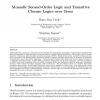Free Online Productivity Tools
i2Speak
i2Symbol
i2OCR
iTex2Img
iWeb2Print
iWeb2Shot
i2Type
iPdf2Split
iPdf2Merge
i2Bopomofo
i2Arabic
i2Style
i2Image
i2PDF
iLatex2Rtf
Sci2ools
137
click to vote
ENTCS
2006
2006
Monadic Second-Order Logic and Transitive Closure Logics over Trees
Model theoretic syntax is concerned with studying the descriptive complexity of grammar formalisms for natural languages by defining their derivation trees in suitable logical formalisms. The central tool for model theoretic syntax has been monadic second-order logic (MSO). Much of the recent research in this area has been concerned with finding more expressive logics to capture the derivation trees of grammar formalisms that generate non-context-free languages. The motivation behind this search for more expressive logics is to describe formally certain mildly context-sensitive phenomena of natural languages. Several extensions to MSO have been proposed, most of which no longer define the derivation trees of grammar formalisms directly, while others introduce logically odd restrictions. We therefore propose to consider first-order transitive closure logic. In this logic, derivation trees can be defined in a direct way. Our main result is that transitive closure logic, even determinist...
Related Content
| Added | 12 Dec 2010 |
| Updated | 12 Dec 2010 |
| Type | Journal |
| Year | 2006 |
| Where | ENTCS |
| Authors | Hans-Jörg Tiede, Stephan Kepser |
Comments (0)

